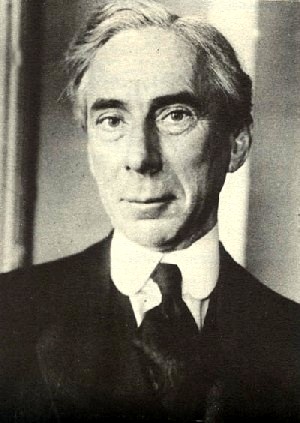- About MAA
- Membership
- MAA Publications
- Periodicals
- Blogs
- MAA Book Series
- MAA Press (an imprint of the AMS)
- MAA Notes
- MAA Reviews
- Mathematical Communication
- Information for Libraries
- Author Resources
- Advertise with MAA
- Meetings
- Competitions
- Programs
- Communities
- MAA Sections
- SIGMAA
- MAA Connect
- Students
- MAA Awards
- Awards Booklets
- Writing Awards
- Teaching Awards
- Service Awards
- Research Awards
- Lecture Awards
- Putnam Competition Individual and Team Winners
- D. E. Shaw Group AMC 8 Awards & Certificates
- Maryam Mirzakhani AMC 10 A Awards & Certificates
- Two Sigma AMC 10 B Awards & Certificates
- Jane Street AMC 12 A Awards & Certificates
- Akamai AMC 12 B Awards & Certificates
- High School Teachers
- News
You are here
Quotations in Context: Russell
“Thus mathematics may be defined as the subject in which we never know what we are talking about, nor whether what we are saying is true.”
This quotation from the logician Bertrand Russell originally appeared in an article, “Recent Work on the Principles of Mathematics,” published in 1901 by The International Monthly [Russell 1901]. Russell later included the work in his book Mysticism and Logic in 1918, where the essay in question appeared as the chapter “Mathematics and the Metaphysicians” [Russell 1918]. In this later work, he amended the original article with some corrective footnotes, reflecting changes in his understanding of some of the topics over the intervening years. Russell also admitted in the preface to Mysticism and Logic that the tone of the article was not entirely his idea, and that the editor of the magazine had urged him to make it “as romantic as possible” [Russell 1918, p. vi].

Photograph of Bertrand Russell in 1924. Public domain, Wikimedia Commons.
The article “Recent Work in the Philosophy of Mathematics” was intended for a general audience, and covered topics such as Zeno’s paradoxes of motion, infinitesimals, infinite cardinals, and the differences between Euclid’s work and that of modern geometers. The overall theme of the work concerned the definition of mathematics.
Russell opened the essay with the claim that “pure” mathematics was born in the 19th century, specifically in the work of George Boole. Pure mathematics, in this context, was defined by Russell as being identical to formal, symbolic logic. Russell argued that “pure” mathematical work is concerned only with discovering rules of valid inference; for example, given that property \(A\) is true of anything, can you safely conclude that property \(B\) is true of anything? He stated that questions about whether or not property \(A\) really is true, or what the “thing” is that we are talking about, are questions that belong to “applied” mathematics.
It was at this point in the article that the quotation appeared:
We start, in pure mathematics, from certain rules of inference, by which we can infer that if one proposition is true, then so is some other proposition. These rules of inference constitute the principles of formal logic. We then take any hypothesis that seems assuring, and deduce its consequences. If our hypothesis is about anything, and not about some one or more particular things, then our deductions constitute mathematics. Thus mathematics may be defined as the subject in which we never know what we are talking about, nor whether what we are saying is true [Russell 1901, p. 84].
Since Russell was considering mathematics as nothing but formal logic, and since he required that mathematics be distinguished from the “applied” world by concentrating on the validity of rules of inference and not the validity of the hypotheses on which those rules are used, he summed this argument up with the given quotation. In the context of the article, the quotation appears to be a somewhat tongue-in-cheek, but accurate, summation of the idea that logical rules of inference are not concerned with what the hypotheses of an argument may be or whether they are true.
In closing, I’d like to include the equally witty line that follows the quotation from the article:
People who have been puzzled by the beginnings of mathematics will, I hope, find comfort in this definition, and will probably agree that it is accurate [Russell 1901, p. 84].
References
Russell, Bertrand. 1901, July. Recent Work on the Principles of Mathematics. The International Monthly 4(1): 83–101.
Russell, Bertrand. 1918. Mysticism and Logic and Other Essays. London: Longmans, Green and Co.
“Quotations in Context” is a regular column written by Michael Molinsky that has appeared in the CSHPM/SCHPM Bulletin of the Canadian Society for History and Philosophy of Mathematics since 2006 (this installment was first published in May 2006). In the modern world, quotations by mathematicians or about mathematics frequently appear in works written for a general audience, but often these quotations are provided without listing a primary source or providing any information about the surrounding context in which the quotation appeared. These columns provide interesting information on selected statements related to mathematics, but more importantly, the columns highlight the fact that students today can do the same legwork, using online databases of original sources to track down and examine quotations in their original context.
Michael Molinsky (University of Maine at Farmington), "Quotations in Context: Russell," Convergence (December 2022)




